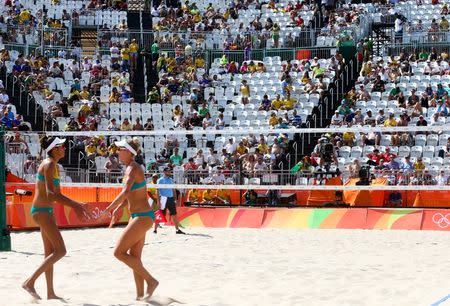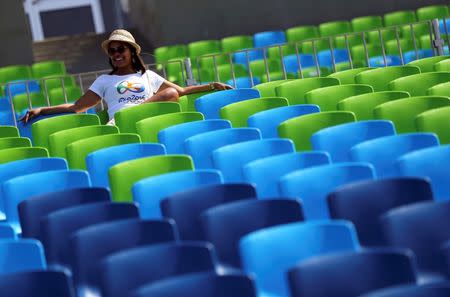Where did the crowd go? Rio organizers battle empty seats
By Stephen Eisenhammer and Karolos Grohmann RIO DE JANEIRO (Reuters) - Brazil's best gold medal hopes in women's beach volleyball played on Thursday under a blue sky at one of the Olympics' most iconic venues. There was no surprise in the score: Talita Rocha and Larissa Franca won in straight sets. The surprise was that the arena on Copacabana beach was only about 70 percent full. And when the Brazilian duo left the court, much of the crowd did too. By the time the Netherlands played Russia in the final game of the morning session, the 12,000-seat arena looked maybe 30 percent full. For a sport in which Brazil has a storied tradition, played in a stunning venue with a view over the Atlantic, the empty seats are a major headache for organisers. Rugby sevens, canoe slalom and dressage have also had thousands of empty seats in recent days. Smaller venues like boxing have had hundreds. "We see some empty spaces in stadiums, we are working on it," Mario Andrada, spokesman for the Rio 2016 organising committee told reporters on Thursday, without providing details on what exactly was being done. Despite repeated assurances, little appears to have been resolved after five days of competition. Empty seats are disliked by athletes, broadcasters and federations alike. They sap atmosphere for those competing and value for broadcasters who pay millions of dollars to secure rights for events that, when devoid of fans, seem far less interesting and exciting. Andrada said a programme to give 240,000 tickets to school children did not include beach volleyball as the intention was use them for sports with which Brazilians are less familiar with, such as rugby and golf. For the London Olympics in 2012, volunteers and army personnel working at the Game were allowed to fill empty seats. This is not happening in Rio, mainly because the organising committee is still desperately in need of the cash from last-minute ticket sales. The committee is running a deficit of between 400 million and 500 million reais ($121 million to $151 million), a Reuters report said last month. One security official at the beach volleyball said they had been banned from watching games on their days off after one officer was caught bringing a colleague working at another venue. "It's really frustrating," he said, declining to give his name for fear of punishment. Volunteers also said they were not entitled to free tickets, even when events had already started and empty seats were there for everyone to see. For the beach volleyball, Andrada said the main problem was the format, with the same ticket getting you access to multiple matches. "The public stays more focused on Brazilians and then they leave." At similar events elsewhere in the world, organisers resolve this by scanning ticket holders when they leave and making those seats available for re-sale. This system is not being used at Rio 2016. Andrada also said scalpers were an issue with some 12,000 tickets of all kind having been confiscated from illegal sellers. (Writing by Stephen Eisenhammer and Karolos Grohmann, editing by Neil Robinson)

 Yahoo Sport
Yahoo Sport 















































